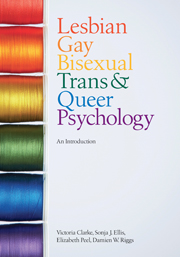Book contents
- Frontmatter
- Contents
- List of boxes
- Introduction: how to read and use this book
- Section I History, contexts and debates in LGBTQ psychology
- Section II Understanding social marginalisation in LGBTQ lives
- Section III LGBTQ experiences across the lifespan
- Conclusion
- 11 The future of LGBTQ psychology
- Glossary
- Additional resources
- References
- Index
- References
11 - The future of LGBTQ psychology
from Conclusion
- Frontmatter
- Contents
- List of boxes
- Introduction: how to read and use this book
- Section I History, contexts and debates in LGBTQ psychology
- Section II Understanding social marginalisation in LGBTQ lives
- Section III LGBTQ experiences across the lifespan
- Conclusion
- 11 The future of LGBTQ psychology
- Glossary
- Additional resources
- References
- Index
- References
Summary
Overview
• Beyond the ‘usual suspects’
• Intersectionality and privilege
• Applications of LGBTQ psychology
• Future directions
Beyond the ‘usual suspects’
Until relatively recently, most research in LGBTQ psychology has relied on samples of primarily white, middle-class lesbians and gay men living in western countries such as Britain and the USA. There is now an emerging body of research documenting the experiences of LGBTQ people from a wider range of backgrounds. Although this is an important development in LGBTQ psychological research, and one that signals more adequate engagement with the diversity within LGBTQ communities, there remain issues in relation to the representativeness of the field that require attention.
One of these issues is the beliefs and values that have shaped the field of LGBTQ psychology. Not only has much of the knowledge that we have about LGBTQ people been derived from samples of the ‘usual suspects’ (i.e., white, middle-class, coupled lesbians and gay men), but this knowledge has primarily been produced in a framework of ‘white, middle-classness’: the theories, the models of identity and the methods of analysis that LGBTQ psychologists draw on are primarily based on white, middle-class beliefs and values. As we highlighted in Chapter 4, there are many social and cultural frameworks or identities through which the lives of LGBTQ people are shaped: race, religion, gender, ability, geographic location and, of course, sexuality. In this final chapter, drawing on Damien's (Riggs, 2007a) work on racial norms (see also Chapter 4), we examine how norms of whiteness have shaped LGBTQ psychology.
- Type
- Chapter
- Information
- Lesbian, Gay, Bisexual, Trans and Queer PsychologyAn Introduction, pp. 241 - 256Publisher: Cambridge University PressPrint publication year: 2010



